| | |

Chapter 67
|
|
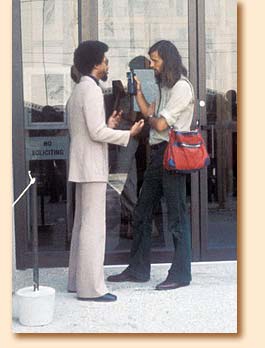 |
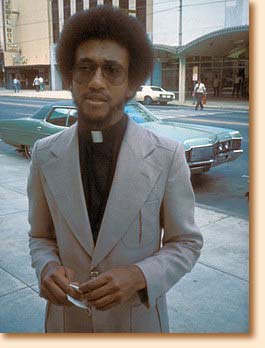 |
|
|
|
Only when the system meets
organized resistance does it come down on you hard. Countless black leaders
have been gunned down by police in their own homes. Even liberals like Rev. Ben Chavis from Wilmington, North Carolina, are severely oppressed.
Here he is telling me
about it: "We were attacked by the Klan, a number of us were shot. One of our
student leaders, 17 years old, was killed. We tried to organize against racism
in the schools and started to run people for office from my church. There are
no elected black officials in the county, which is 50% black. They couldn't
drive us out through fear and violence, so they decided to stop the movement by
using courts and prisons. We were indicted on five felony charges from
conspiracy to murder. The 10 of us were sentenced to a total of 282 years in
prison, and I received a 34 year sentence."
Partly as a result of my book a
strong campaign for his release was started in Europe. Later Ben Chavis became
Executive Director of the NAACP. But
34 years is a rather mild sentence in America. Others have received more than
1.000 years in prison. (In Denmark it is rare that anybody serves longer than
eight years). |
| | |
|
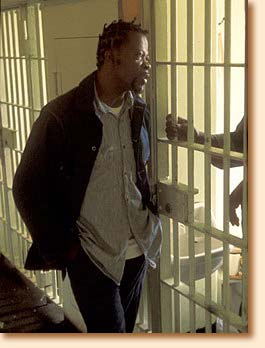 |
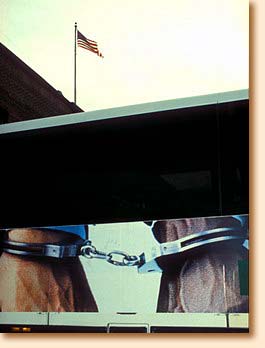 |
| |
|
And this too is a mild sentence compared to the one my best
friend in California - Popeye Jackson - eventually got.
When I met Popeye I had
reached the end of my journey. As a vagabond I loved the freedom to lose myself in the
individual person, and naively believed that I could keep myself free of racism. But now I began to feel that my vagabonding had been a
privileged white flight
like so many others. I had taken
thousands of pictures, but increasingly felt that I was just exploiting the
suffering with my camera and it was beginning to make me sick.
|
| | |
|
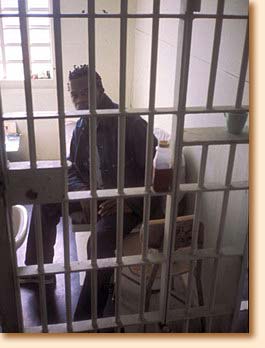 |
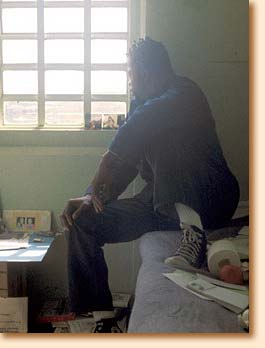 |
|
|
|
While I had been taking pictures, dozens of my
friends had gone off to prison - friends who had acted in protest
against the system, many of them without thinking about it - while
I had just been thinking and photographing without acting. Whether
my escape had been on the highway or into the pictures, I had
nevertheless been an integrated part of the system. The more I had come to love America, the more
difficult it was to remain a silent observer to its self-destruction. I wanted
increasingly to help change it. |
| | |
|
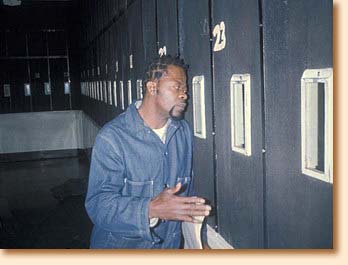 |
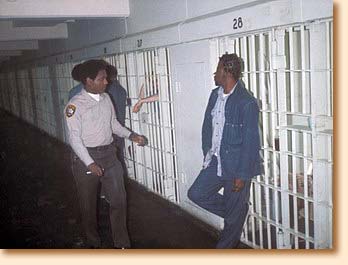 |
|
|
|
I felt that I was exploiting the suffering with my camera and
sensed my own growing racism. It is not pleasant to discover negative thinking in oneself, but
racism is not a voluntary matter. So rather than feeling ashamed, my racism made me feel part of
America and I wanted to help change the country I had come to love by becoming
actively anti-racist.
Though I had come to see everyone as a victim, I knew that we
eventually have to take responsibility for our crimes. |
| | |
|
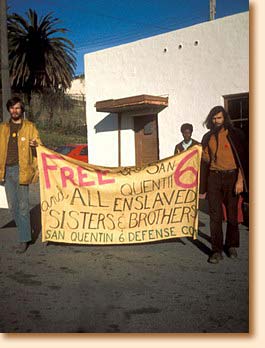 |
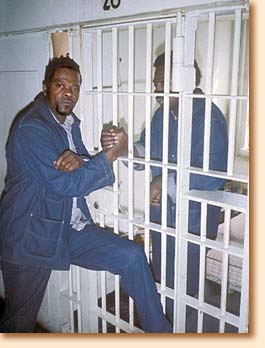 |
|
|
|
Therefore I put my camera away and began to work with Popeye. Popeye proved to me that also the victim is more than just a
victim and capable of offering resistance. Popeye, who was proud of his lower ghetto background
and always dressed in typical hustler fashion, was for me the personification
of the underclass with all its openness, violence, sexism, beautiful culture,
generosity - all the things we in Europe consider stereotypically American.
Popeye had himself been on a long journey. He was only 10 years old the first
time he went to jail and had since spent more than 19 years in prison. During
the long confinement Popeye grew politically aware began organizing the other inmates into
the United Prisoners Union. He felt that it
is only possible to escape the ghetto though a collective struggle against a
racist system. |
| | |
|
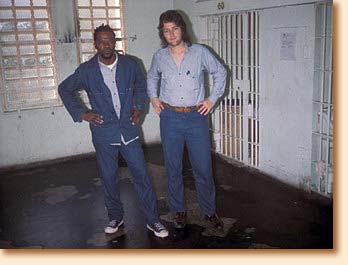 |
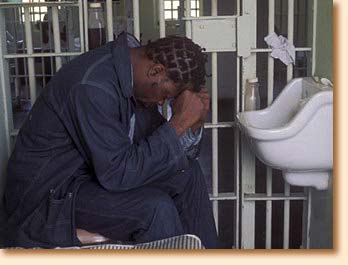 |
|
|
|
Popeye's influence on the prison
inmates increased and I was told that the police had tried to get him back in
prison by planting dope in his car just as on occasion they had threatened him
with death. Working in the Union we became closer and closer bound to each
other. When he saw the big holes in my shoes, he one day gave me a pair of
boots without a word. Though I had stopped photographing, he persuaded me to
smuggle the camera inside the prison and take these pictures for the prison
paper. Here it made a deep impression on me to see how Popeye constantly tried
to organize the inmates under these inhuman conditions that stifled all private
life, and where the system used almost any means to break people down. |
| | |
|
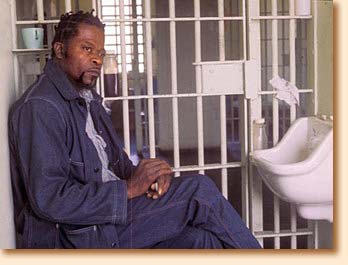 |
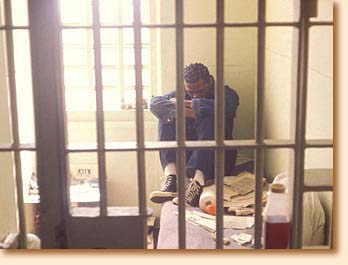 |
|
|
|
Exactly because I was totally paralyzed myself in
these surroundings, it made an indelibly strong impression on me
to see how Popeye got the other inmates to read political
literature even though it was impossible to imagine how anyone
could read in this ominous noise and constant fear. Many inmates
told me that Popeye had made a similar impression on them, because
he was not a "fake intellectual revolutionary," but clearly one of
their own. |
| | |
|
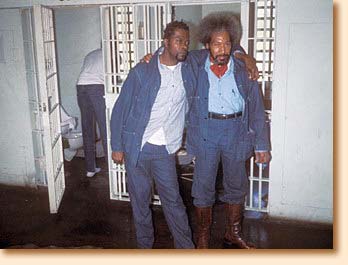 Although an extremely promising
organizer, Popeye was naturally not without severe human failings that
disturbed many of the volunteers in our group, particularly the women. They had
learned a lesson from the naive left of the 60's, which had romantically
embraced all kinds of rapists as the "avant garde of the revolution." Some of
them left our group because of Popeye's sexism. I had severe clashes with them
over these issues, because I after my own ghettoization felt that their views
were just another form of racism - a modern up-to-date radical way of saying: I
don't like the product of our oppression. "If you think a man can come out of 300 years of
slavery and 19 years of prison as an angel, you are fools. Even Martin Luther
King was sexist, Coretta says today. If you think that a man should be denied a
powerful leadership role until he in every respect lives up to white liberal
norms, then you are as powerful an enemy of affirmative action as the worst
Southern racist. If you turn your backs on Popeye now, then it is not their
racism which forces him back into a ghetto, but yours," I said. Having myself
ended up in the sexist trap, I was a great defender of Popeye. But thereby I
was also betraying him: just as whites do not put enough pressure on each
other's racism, I and the other men in the group did not try to change Popeye's
sexism, if only to allow him to be a more powerful organizer. Although an extremely promising
organizer, Popeye was naturally not without severe human failings that
disturbed many of the volunteers in our group, particularly the women. They had
learned a lesson from the naive left of the 60's, which had romantically
embraced all kinds of rapists as the "avant garde of the revolution." Some of
them left our group because of Popeye's sexism. I had severe clashes with them
over these issues, because I after my own ghettoization felt that their views
were just another form of racism - a modern up-to-date radical way of saying: I
don't like the product of our oppression. "If you think a man can come out of 300 years of
slavery and 19 years of prison as an angel, you are fools. Even Martin Luther
King was sexist, Coretta says today. If you think that a man should be denied a
powerful leadership role until he in every respect lives up to white liberal
norms, then you are as powerful an enemy of affirmative action as the worst
Southern racist. If you turn your backs on Popeye now, then it is not their
racism which forces him back into a ghetto, but yours," I said. Having myself
ended up in the sexist trap, I was a great defender of Popeye. But thereby I
was also betraying him: just as whites do not put enough pressure on each
other's racism, I and the other men in the group did not try to change Popeye's
sexism, if only to allow him to be a more powerful organizer. |
| | |
|
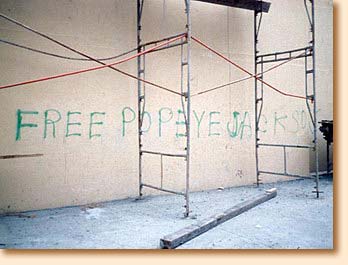 |
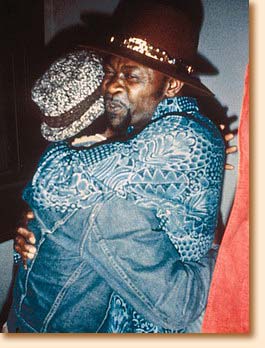 |
|
|
|
Outside the prison an effective campaign was
started to get Popeye released, and at long last he was freed. We
threw a big "back in the world" party for him. Popeye had often
warned me against FBI-infiltrators among the members of the Union.
Having always trusted anybody I met in my vagabonding, I took his
warnings lightly as normal ghetto paranoia. For some reason I had
difficulty imagining anybody I knew being secret police. Therefore
it totally knocked me out to experience the terror the system
utilized against Popeye's union and to realize that one of my
friends whom I had most faith in indeed was from the secret
police. |
| | |
|
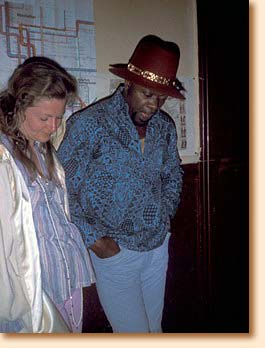 |
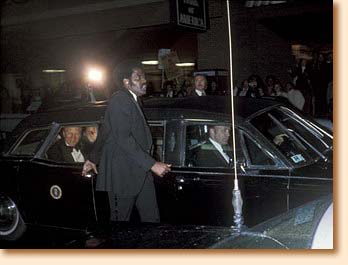 |
|
|
|
It was Sara Jane Moore, who was a bit older than
the others, and whom we thought was a nice, sympathetic, although
slightly confused, housewife from the suburbs It therefore shocked
us when suddenly in the newspapers she openly confessed that she
was a spy for the FBI, but now had pangs of conscience because
during our work she had been converted to Popeye's views. Two
months later she was close to changing world history, when she
attempted to shoot President Ford seen here in the limousine on
Union Square. She had such terrible torment over what she had
brought about by her FBI work that she wanted to get revenge on
the FBI by assassinating the very head of the system, as she said.
|
| | |
|
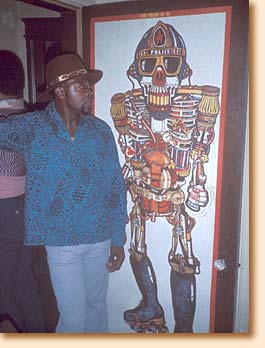 |
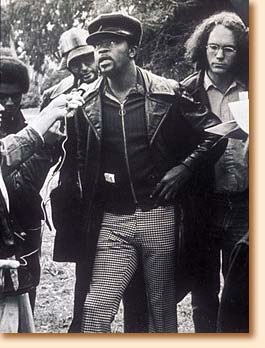 |
|
|
|
|
So what had happened between these two episodes,
which could throw her so off balance? Saturday night, a couple of
days after our party, Popeye was scheduled to come over to select
the prison pictures for our paper. He called up, however, and said
he didn't have time as he had a meeting with the Vietnam Veterans
Against the War. We arranged that I should come to the meeting
later in the evening and drive home with him. Only two hours
beforehand I got a phone call asking me not to go home with
Popeye. If I had not received that phone call, I would not have been
in a position to watch the news next evening: |
|
|
|
|
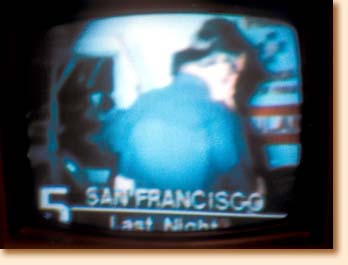 |
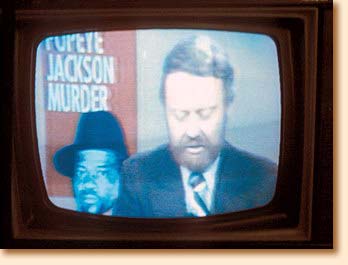 |
| | |
|
"Good Evening, this is the Sunday edition of the eleven o'clock Eyewitness
News. The San Francisco Police continue their investigation into the
execution-style slaying of prison reformer Popeye Jackson, who was head of the
United Prisoners Union. Jackson was sitting in a car with Sally Voye, a school
teacher from Vallejo, when the shooting took place 2:45 Sunday morning. Police
say they died immediately. |
| | |
|
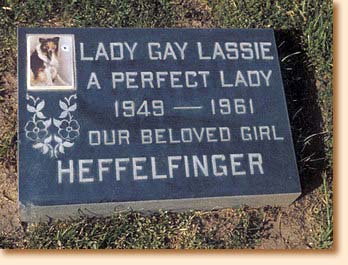 |
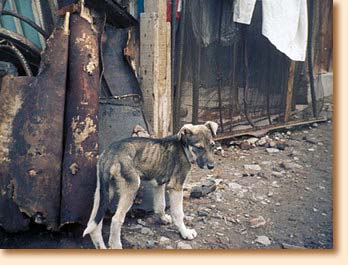 |
| | |
|
- Now, like many of you I love dogs. I am concerned about them. That's why I
feed my dogs Alpo. Because meat is a dog's natural food. That's what they love
most. And Alpo's meat dinner has beef products that are really good for them.
Not a speck of cereal. Not a better dog food in the world. |
| | |
|
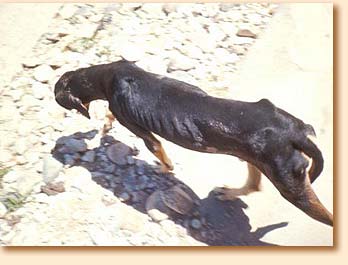 |
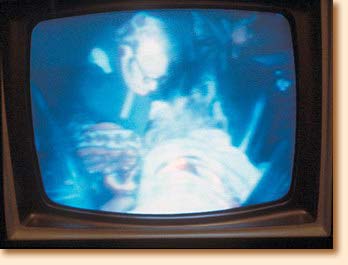 |
| | |
|
(Police): Reports indicate that the killer first fired a shot that smashed a
window of the car. The first bullet hit Miss Voye and then Jackson. The gunman
was not there to rob the people. Wallets were intact.
This sounds like an execution-style slaying?
- You could call it that. We're working on that as a possible theory. We have
to rule out robbery. |
| | |
|
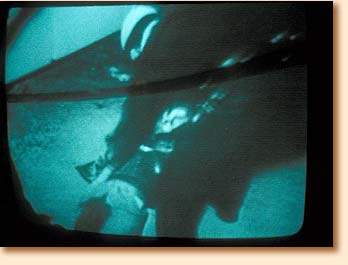 |
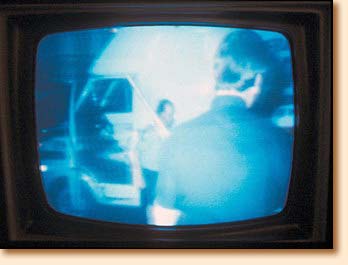 |
| | |
|
- Police say a number of people went to their windows when they heard the
shots. Police will begin questioning them tomorrow to find the killer. |
| | |
|
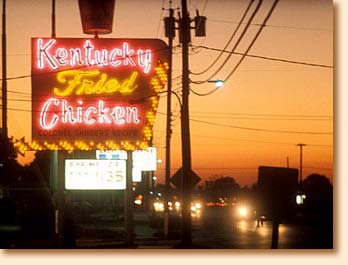 |
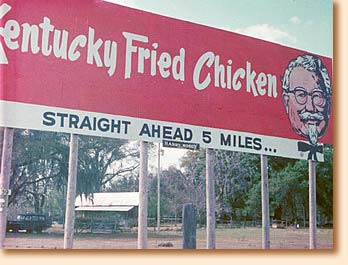 |
| | |
|
- Here's how it starts. You see someone take that first mouth-watering bite and
you've just got to get a taste for yourself. In this world there's only one
fried chicken that always tastes so finger lickin' good: And you've got to say
HEY! It's a Kentucky Fried Chicken day!" |
| | |
|
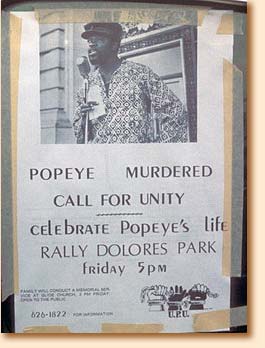 |
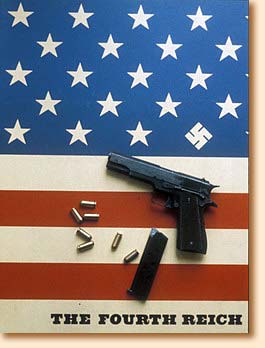 |
| | |
|
Although it was my best friend I saw lying in a pool of blood on TV only a
few hours after I myself would have driven home with him on that disastrous
night, I was unable to cry the first four days - so unreal did it all seem to
me in this peculiar American mixture of dog food and fried chicken commercials.
Our system of oppression can do anything totally unimpeded, for it is capable
of making us forget in the next instant what we have just seen. |
| | |
|
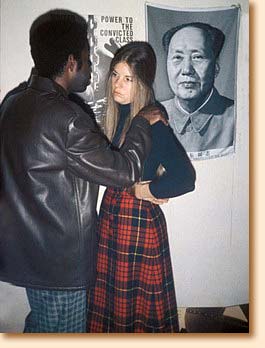 |
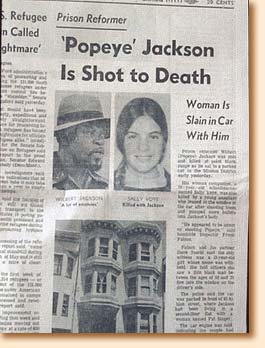 |
| | |
|
Not until the
funeral did it dawn on me what had happened and I totally broke down in tears.
Then I had also come to realize that Sally, whom I liked so much, who worked
with ghetto kids and prisoners though she was from the safe suburbs, and who
even had tried to work on Popeye's sexism - then it dawned on me that this
fantastic woman had also been murdered for no other reason than that she would
have been a witness to the assassination. And naturally I also knew what my
destiny would have been if I had been with them that night. |
| | |
|
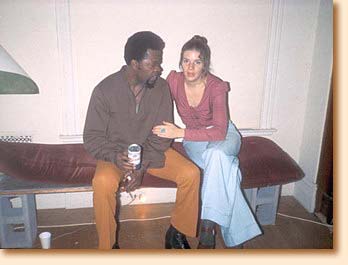 |
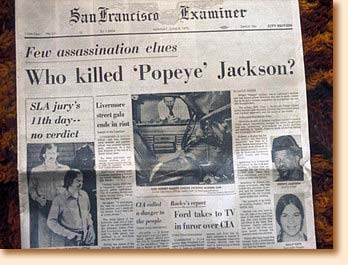 |
| | |
|
Here is Sally seen
with Popeye a few days before their murder. he assassin has not been found, but
now when Sara Jane Moore has been sentenced to life and in an
interview with Playboy has given her harrowing account of her work
for the FBI and how the FBI began threatening her life when they
realized she was being converted to Popeye's ideas, few of us have
any doubts. Popeye had often warned me of ex-convicts who could
have struck special early release deals with police. But Popeye
was never afraid of dying and the San Francisco Chronicle later
revealed that police previously had threatened to kill him. |
| | |
|
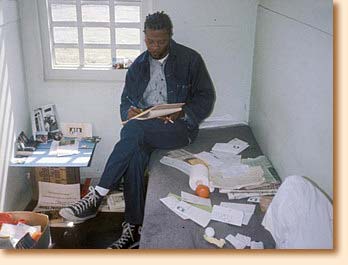 |
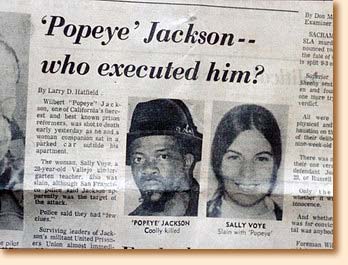 |
| | |
|
In his last article, which he wrote while I
was with him in prison, he said: "We ought not to fear death. We
are the convicted class and only through revolution can we win our
freedom and the freedom of all oppressed people in the world." At
the funeral his many union workers and prison friends - Indians,
blacks, Chicanos and whites - kissed him farewell, while others
will only be able to get "back in the world" to see his tomb a
generation from now. His mother, who every single week during the
19 years had brought him cake in prison, suffered a total
breakdown in front of the coffin. |
| | |
|
|
| | |